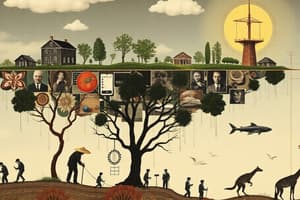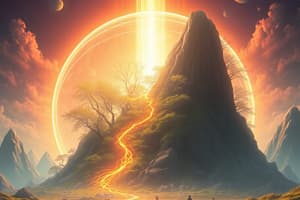Podcast
Questions and Answers
What is the primary role of decomposers in an ecosystem?
What is the primary role of decomposers in an ecosystem?
- Consuming other organisms for energy
- Producing energy through photosynthesis
- Scavenging for dead animals
- Breaking down dead organisms and returning raw materials to the environment (correct)
How do autotrophs obtain their energy?
How do autotrophs obtain their energy?
- By decomposing dead organisms
- By consuming other animals
- By producing food through photosynthesis (correct)
- By consuming plants
Which type of consumer exclusively eats plants?
Which type of consumer exclusively eats plants?
- Scavengers
- Herbivores (correct)
- Omnivores
- Carnivores
Which category of consumers can eat both plants and animals?
Which category of consumers can eat both plants and animals?
Which of the following organisms is an example of a producer?
Which of the following organisms is an example of a producer?
What role do scavengers play in an ecosystem?
What role do scavengers play in an ecosystem?
What is the primary rule to follow when balancing chemical equations?
What is the primary rule to follow when balancing chemical equations?
According to the Law of Conservation of Mass, what must be true for a balanced chemical equation?
According to the Law of Conservation of Mass, what must be true for a balanced chemical equation?
In the reaction Na2S + 2 HCl → 2 NaCl + H2S, which coefficient balances the hydrogen atoms?
In the reaction Na2S + 2 HCl → 2 NaCl + H2S, which coefficient balances the hydrogen atoms?
Why should we never change the subscripts when balancing chemical equations?
Why should we never change the subscripts when balancing chemical equations?
What purpose does drawing a box around each substance serve in balancing equations?
What purpose does drawing a box around each substance serve in balancing equations?
Which of the elements in the equation Na2S + 2 HCl → 2 NaCl + H2S is already balanced without adding coefficients?
Which of the elements in the equation Na2S + 2 HCl → 2 NaCl + H2S is already balanced without adding coefficients?
What is produced as a result of cellular respiration?
What is produced as a result of cellular respiration?
Where does cellular respiration take place in a plant cell?
Where does cellular respiration take place in a plant cell?
What is the main purpose of photosynthesis?
What is the main purpose of photosynthesis?
Which of the following are used in photosynthesis to make glucose and oxygen?
Which of the following are used in photosynthesis to make glucose and oxygen?
From where do plants acquire the carbon and hydrogen needed for photosynthesis?
From where do plants acquire the carbon and hydrogen needed for photosynthesis?
Which component of the food chain is responsible for recycling materials for use by producers?
Which component of the food chain is responsible for recycling materials for use by producers?
What percentage of energy is transferred to a higher trophic level in an energy pyramid?
What percentage of energy is transferred to a higher trophic level in an energy pyramid?
Which level in the food chain directly consumes producers?
Which level in the food chain directly consumes producers?
How is a food web different from a food chain?
How is a food web different from a food chain?
What is the primary source of energy for the food chain?
What is the primary source of energy for the food chain?
Which diagram is used to show the amount of energy that moves from one feeding level to another in a food web?
Which diagram is used to show the amount of energy that moves from one feeding level to another in a food web?
Which of the following terms describes the water and plants consumed by groundhogs in a meadow?
Which of the following terms describes the water and plants consumed by groundhogs in a meadow?
Which of the following factors would most likely cause an increase in a population size?
Which of the following factors would most likely cause an increase in a population size?
What does the y-axis represent in a graph showing the population of American Plains Bison between 1902 and 1915?
What does the y-axis represent in a graph showing the population of American Plains Bison between 1902 and 1915?
Which pair of events could lead to a decrease in the population size of American Plains Bison?
Which pair of events could lead to a decrease in the population size of American Plains Bison?
What is the trend observed in the population of American Plains Bison between 1902 and 1915?
What is the trend observed in the population of American Plains Bison between 1902 and 1915?
What is the primary role of decomposers in an ecosystem?
What is the primary role of decomposers in an ecosystem?
Which of the following statements best describes the 10% rule in an energy pyramid?
Which of the following statements best describes the 10% rule in an energy pyramid?
In an energy pyramid, which trophic level has the highest energy content?
In an energy pyramid, which trophic level has the highest energy content?
What type of organism is likely to be at the top of a food web?
What type of organism is likely to be at the top of a food web?
Which form of energy is primarily passed from producers to consumers in a food chain?
Which form of energy is primarily passed from producers to consumers in a food chain?
Which of the following best describes a food web?
Which of the following best describes a food web?
Which of the following levels of organization includes both biotic and abiotic factors?
Which of the following levels of organization includes both biotic and abiotic factors?
Which level of ecological organization consists of multiple populations of different species interacting in a shared environment?
Which level of ecological organization consists of multiple populations of different species interacting in a shared environment?
What is an example of an abiotic factor in an environment?
What is an example of an abiotic factor in an environment?
In an ecosystem, what primarily distinguishes the concept of 'community' from 'population'?
In an ecosystem, what primarily distinguishes the concept of 'community' from 'population'?
Which of the following is NOT an abiotic factor?
Which of the following is NOT an abiotic factor?
What will happen to a population size if the birth rate is equal to the death rate?
What will happen to a population size if the birth rate is equal to the death rate?
How do abiotic factors influence organisms in an ecosystem?
How do abiotic factors influence organisms in an ecosystem?
Which definition best describes a biome?
Which definition best describes a biome?
What is the definition of birth rate?
What is the definition of birth rate?
What does population density refer to?
What does population density refer to?
Which of the following is a condition that limits the growth of a species?
Which of the following is a condition that limits the growth of a species?
Which factor would not decrease the population size?
Which factor would not decrease the population size?
How is the term 'immigration' defined?
How is the term 'immigration' defined?
Which level of organization comes last in the hierarchy of the ecosystem?
Which level of organization comes last in the hierarchy of the ecosystem?
What would be an example of a biotic limiting factor?
What would be an example of a biotic limiting factor?
If there is an increase in emigration, what is most likely to happen to the population size?
If there is an increase in emigration, what is most likely to happen to the population size?
Which of the following best describes the law of conservation of mass?
Which of the following best describes the law of conservation of mass?
Which type of chemical reaction is represented by 2H₂O₂ → 2H₂O + O₂?
Which type of chemical reaction is represented by 2H₂O₂ → 2H₂O + O₂?
In the reaction 2Mg + O₂ → 2MgO, what are the reactants?
In the reaction 2Mg + O₂ → 2MgO, what are the reactants?
Which statement correctly defines a synthesis reaction?
Which statement correctly defines a synthesis reaction?
Which type of reaction is 2KI + Pb(NO₃)₂ → PbI₂ + 2KNO₃?
Which type of reaction is 2KI + Pb(NO₃)₂ → PbI₂ + 2KNO₃?
What are the products in the balanced equation 4 Al + 3 O₂ → 2 Al₂O₃?
What are the products in the balanced equation 4 Al + 3 O₂ → 2 Al₂O₃?
What happens to the mass of the products in a chemical reaction according to the law of conservation of mass?
What happens to the mass of the products in a chemical reaction according to the law of conservation of mass?
Which type of reaction shows two elements in different compounds trading places?
Which type of reaction shows two elements in different compounds trading places?
Which of the following is the correct chemical equation for the reaction between hydrogen gas and chlorine gas to produce hydrogen chloride?
Which of the following is the correct chemical equation for the reaction between hydrogen gas and chlorine gas to produce hydrogen chloride?
What is the physical state symbol for water when it is produced as a product in a chemical reaction?
What is the physical state symbol for water when it is produced as a product in a chemical reaction?
Which element is a diatomic molecule?
Which element is a diatomic molecule?
Which acronym can help you remember the diatomic elements?
Which acronym can help you remember the diatomic elements?
In the reaction $CH_4 + 2O_2 → CO_2 + 2H_2O$, what is the coefficient for $O_2$?
In the reaction $CH_4 + 2O_2 → CO_2 + 2H_2O$, what is the coefficient for $O_2$?
What is the subscript for oxygen in carbon dioxide ($CO_2$)?
What is the subscript for oxygen in carbon dioxide ($CO_2$)?
Which physical state symbol represents a substance dissolved in water?
Which physical state symbol represents a substance dissolved in water?
How many hydrogen atoms are in one molecule of methane ($CH_4$)?
How many hydrogen atoms are in one molecule of methane ($CH_4$)?
Flashcards are hidden until you start studying
Study Notes
Energy Flow in Ecosystems
- Energy flows through ecosystems in the form of food energy, which is passed from one organism to another through consumption.
Producers (Autotrophs)
- Organisms that make their own food through photosynthesis, such as plants, algae, and photosynthetic bacteria.
Consumers (Heterotrophs)
- Organisms that cannot produce their own food and rely on eating other organisms for energy.
- Herbivores: eat plants only
- Carnivores: eat animals only
- Omnivores: eat both plants and animals
- Scavengers: carnivores that feed on dead organisms
Decomposers
- Organisms that break down biotic wastes and dead organisms, such as bacteria, fungi, mold, and worms.
Food Chains and Food Webs
- Food chains: a series of organisms that eat other organisms, with energy flowing from one level to the next
- Food webs: a network of interconnected food chains, showing the complexity of energy flow in an ecosystem
Balancing Chemical Equations
- Chemical reactions involve the rearrangement of atoms, with no atoms lost or gained
- The law of conservation of mass: matter is not created or destroyed, only rearranged
- Tips for balancing chemical equations: draw a box around each substance, never touch the subscript, keep the chemical formula as is, and change coefficients only
Plant Processes
- Mitochondria: site of cellular respiration, where energy is produced
- Cellular Respiration: process by which cells generate energy from glucose
- Photosynthesis: process by which plants convert solar energy into chemical energy
- Sources of carbon and hydrogen for photosynthesis: carbon dioxide from air and hydrogen from water
Living Things in the Environment
- Biotic and abiotic factors in an ecosystem: biotic factors are living organisms, while abiotic factors are non-living components of the environment
- Energy pyramid: a diagram showing the amount of energy available at each trophic level
Ecology
- Groundhogs live in a meadow, drinking water and eating plants, which are biotic factors
- Population size can increase due to births and immigration, while decreasing due to deaths and emigration
- The graph shows the population of American Plains Bison in Yellowstone National Park between 1902 and 1915, with a decreasing population size over time
Interactions of Biotic and Abiotic Factors in an Ecosystem
- Each individual organism has a role in the flow of energy and matter
- Organisms rely on the nonliving environment for survival
- Abiotic factors influence where organisms can survive
Studying That Suits You
Use AI to generate personalized quizzes and flashcards to suit your learning preferences.




